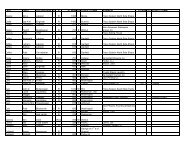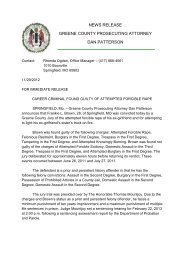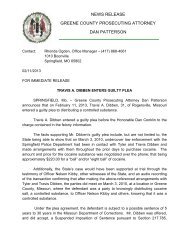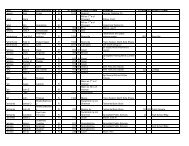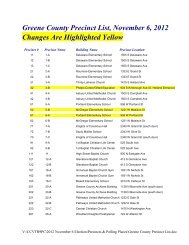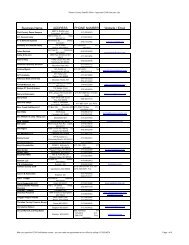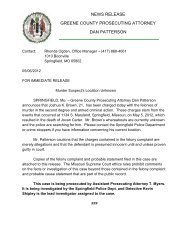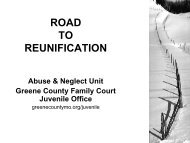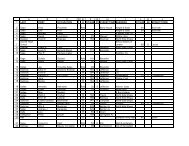A Teenager's Guide to Juvenile Court - Greene County, Missouri
A Teenager's Guide to Juvenile Court - Greene County, Missouri
A Teenager's Guide to Juvenile Court - Greene County, Missouri
You also want an ePaper? Increase the reach of your titles
YUMPU automatically turns print PDFs into web optimized ePapers that Google loves.
A Teenager’s <strong>Guide</strong> <strong>to</strong> <strong>Juvenile</strong> <strong>Court</strong><br />
By Thomas A. Jacobs<br />
Copyright 2010 AsktheJudge.info<br />
CONTENTS<br />
Page<br />
Introduction 3<br />
Terminology 4<br />
Jurisdiction 5<br />
Police Investigation 5<br />
Pre‐Petition Hearing 7<br />
Petition for Delinquency 8<br />
Status Offenses and Diversion 9<br />
Teen <strong>Court</strong> 10<br />
Advisory Hearing 12<br />
Plea Agreement 13<br />
Trial 14<br />
1
Victim’s Bill of Rights 15<br />
Disposition Hearing 16<br />
Violation of Probation 18<br />
Appeal 18<br />
Transfer or Waiver 19<br />
<strong>Juvenile</strong> Records 21<br />
Res<strong>to</strong>ration of Civil Rights 22<br />
Dos and Don’ts for Appearing in <strong>Court</strong> 22<br />
Glossary 24<br />
Resources – Help and Hotlines 26<br />
2
A Teenager’s <strong>Guide</strong> <strong>to</strong> <strong>Juvenile</strong> <strong>Court</strong><br />
By Thomas A. Jacobs<br />
Copyright 2010 All Rights Reserved<br />
Introduction*<br />
Whether you’re an adult or a teenager, going <strong>to</strong> court is scary<br />
and intimidating – especially for the first time. You don’t know<br />
what <strong>to</strong> expect – whether you’ll have <strong>to</strong> speak with the judge,<br />
who else will be there, how <strong>to</strong> dress and whether you go <strong>to</strong> jail<br />
are common concerns.<br />
This guide is an overview of the juvenile justice system in<br />
America. Every state has its own laws and rules about minors<br />
and their rights and responsibilities. The rights of teens and<br />
children are based on the U.S. Constitution, the Bill of Rights<br />
and state and federal laws. This eBook is limited <strong>to</strong> teens that<br />
have been charged with breaking the law.<br />
There are other reasons for going <strong>to</strong> court that are called civil<br />
actions. You may be asking a court <strong>to</strong> change your name, for<br />
permission <strong>to</strong> obtain an abortion, <strong>to</strong> be emancipated, <strong>to</strong><br />
protect your civil rights, <strong>to</strong> live apart from your parents or <strong>to</strong> be<br />
adopted. These subjects are discussed on AsktheJudge.info and<br />
will be addressed in future eBooks.<br />
3
*All words in bold are defined in the Glossary on page 24.<br />
What follows is a general review of the steps involved in a<br />
delinquency case. Delinquency is the process from initial<br />
investigation of a crime <strong>to</strong> sentencing and ultimately release<br />
from jail, probation or parole.<br />
<strong>Juvenile</strong>s in the juvenile justice system are referred <strong>to</strong> as<br />
delinquents while adults are called criminals. The language in<br />
juvenile court differs so that harsh labels don’t follow a<br />
teenager in<strong>to</strong> adulthood. But the underlying criminal offenses<br />
are the same. Each state has one set of criminal laws that apply<br />
<strong>to</strong> everyone. How they are applied <strong>to</strong> juveniles and the<br />
penalties for violating the laws differ because the goal in<br />
juvenile court is rehabilitation while the adult system<br />
emphasizes punishment and community protection.<br />
Terminology<br />
<strong>Juvenile</strong>s<br />
advisory hearing<br />
adjudication hearing<br />
delinquent<br />
department of juvenile corrections<br />
detention<br />
Adults<br />
arraignment<br />
trial<br />
criminal defendant<br />
prison<br />
jail<br />
4
disposition hearing<br />
sentencing<br />
Jurisdiction<br />
<strong>Juvenile</strong> court jurisdiction is based on<br />
the age of the juvenile and the nature of<br />
the alleged crime. Some juveniles may<br />
remain under juvenile court jurisdiction<br />
until they age out at 18 or older<br />
depending on state laws. In some states a minor under a<br />
certain age, for example 8 years old, is by law not capable of<br />
committing a crime and therefore cannot be charged with any<br />
offense. That child may need the assistance of child protective<br />
services. On the other hand, juveniles charged with violent or<br />
habitual crimes, if over a certain age in some states and at any<br />
age in others, may be considered as adults and handled in the<br />
adult criminal system rather than juvenile court (see<br />
Transfer/Waiver below).<br />
Police Investigation<br />
Law enforcement has the authority and duty <strong>to</strong> investigate<br />
criminal activity. The police may interview you at school or at a<br />
school event. They may also conduct searches of your locker,<br />
backpack, car or room at home in the course of their<br />
investigation. However, depending on your state’s laws and<br />
5
the circumstances of the investigation, the police or school<br />
official need either probable cause or reasonable suspicion<br />
that a crime is being committed or a school rule violated before<br />
conducting a search of your property.<br />
School resource officers, who are oftentimes police officers,<br />
also have authority <strong>to</strong> conduct investigations. Depending on<br />
the circumstances, they may or may not need a search warrant.<br />
If you’re taken in<strong>to</strong> cus<strong>to</strong>dy by the<br />
police, they must read your Miranda<br />
rights <strong>to</strong> you before questioning<br />
begins. Contrary <strong>to</strong> popular belief,<br />
the police are only required <strong>to</strong> read<br />
your Miranda rights if they intend <strong>to</strong><br />
question you while you’re in<br />
cus<strong>to</strong>dy.<br />
Did you know?<br />
You must clearly express<br />
your decision <strong>to</strong> remain<br />
silent or <strong>to</strong> have your<br />
parent or at<strong>to</strong>rney present<br />
during the questioning.<br />
Otherwise, the police may<br />
be able <strong>to</strong> question you<br />
and use your statements<br />
against you in court.<br />
In many states they must also tell<br />
you that you can have a parent<br />
present during the questioning. Your<br />
Miranda rights include the right <strong>to</strong> remain silent, that any<br />
statement you make may be used in court against you, and that<br />
you have a right <strong>to</strong> a lawyer.<br />
If the police have “probable cause” <strong>to</strong> believe that you broke<br />
the law, they can either release you <strong>to</strong> your parent or guardian<br />
or they can turn you over <strong>to</strong> the juvenile authorities. You can<br />
6
e held in cus<strong>to</strong>dy (juvenile detention) for 24 <strong>to</strong> 48 hours while<br />
the case is processed and a formal petition is filed with the<br />
court. If the police release you, you may be given a date <strong>to</strong><br />
appear in court, or you may be notified of your court date at a<br />
later time by a process server or by mail.<br />
Pre‐Petition Hearing<br />
If you have been taken <strong>to</strong> detention, there will be a hearing<br />
within 48 hours. Your parents will be notified of the hearing<br />
and are expected <strong>to</strong> appear. This is a hearing limited <strong>to</strong> the<br />
question regarding your continued detention or release. The<br />
judge will decide if you are going <strong>to</strong> be released and <strong>to</strong> whom<br />
as well as any terms you’ll be expected <strong>to</strong> follow. The judge<br />
may require that you return <strong>to</strong> school without any unexcused<br />
absences, have no contact with the alleged victim, and submit<br />
<strong>to</strong> random drug tests.<br />
The court can also release you in<strong>to</strong><br />
house arrest or a home detention<br />
program. That means you’re required<br />
<strong>to</strong> remain at home at all times except<br />
for the hours you’re in school, at<br />
work or attending counseling. Home detention may include<br />
wearing a moni<strong>to</strong>r (ankle bracelet) that keeps track of your<br />
whereabouts. A violation of any release term may result in<br />
your return <strong>to</strong> detention until your next hearing.<br />
7
If the decision is <strong>to</strong> keep you locked up, the judge must make a<br />
finding that a crime has been committed and that there is<br />
probable cause <strong>to</strong> believe you committed it. This decision is<br />
based on the court’s review of the police reports filed in the<br />
case. If the court cannot find probable cause, you will be<br />
released from detention and given your next court date.<br />
A few states authorize the posting of bail in juvenile cases. If<br />
you’re out on bail and you miss a court hearing, the bail<br />
(money) is forfeited and whoever paid the bail for you loses<br />
their money. That’s in addition <strong>to</strong> an arrest warrant the court<br />
may issue for your non‐appearance.<br />
Petition for Delinquency<br />
A petition or complaint is the formal document charging you<br />
with an offense. It is prepared by the prosecu<strong>to</strong>r and filed with<br />
the court. It sets forth your name, date of birth, case number<br />
and name of the alleged crime. It must include a statement<br />
regarding the offense, the name of the victim, and date and<br />
location of the offense.<br />
The petition must also include what are called the “elements”<br />
of the offense. In other words it must spell out what you did<br />
that amounts <strong>to</strong> a violation of the law. For example, if you’re<br />
charged with shoplifting, the petition must state that you <strong>to</strong>ok<br />
an item that was for sale, that it cost a certain amount, and that<br />
you didn’t pay for it. Due process requires that you be given<br />
8
notice of the offense you’re charged with so that you are able<br />
<strong>to</strong> defend yourself in court.<br />
Status Offenses and Diversion<br />
You may have received a ticket or citation <strong>to</strong> appear in court<br />
because you missed school or violated curfew. These violations<br />
are called status offenses. Because you are under 18, your<br />
“status” as a minor brings you within this category of offenses.<br />
They are offenses that an adult cannot commit or be charged<br />
with. Some adults may want <strong>to</strong> ‘runaway’ but it’s not against<br />
the law if they do.<br />
In addition <strong>to</strong> truancy and curfew, status<br />
offenses include alcohol charges for all<br />
those under 21, possession of <strong>to</strong>bacco, and<br />
runaway cases. You have <strong>to</strong> look <strong>to</strong> state<br />
and local laws for the specifics regarding<br />
each of these offenses.<br />
Status offenses are usually handled by<br />
payment of a fine or through a single court appearance. When<br />
you go <strong>to</strong> court, you’ll meet with a court officer or probation<br />
officer who will explain the process <strong>to</strong> you. If this is your first or<br />
second offense and not a major crime, you can expect <strong>to</strong> be<br />
offered a chance <strong>to</strong> complete a diversion program. This is a<br />
program where, upon completion of the terms of diversion, the<br />
case is closed and you don’t have an official record <strong>to</strong> worry<br />
9
about in the future. In other words, your case has been<br />
diverted away from the formal juvenile justice system. The<br />
court maintains its own record of your case in the event you<br />
return on another charge.<br />
A diversion program includes the completion of community<br />
service, payment of a fine, restitution <strong>to</strong> the victim, an<br />
educational class about the offense you committed (it may be<br />
an online class), or counseling if<br />
appropriate. It could also include<br />
random drug testing if substance abuse is<br />
an issue in your life.<br />
You are not required <strong>to</strong> accept or<br />
participate in diversion. The program<br />
requires that you admit the offense. If<br />
you didn’t violate curfew or you have an<br />
explanation regarding the runaway or<br />
curfew incident, you can plead not guilty<br />
and proceed <strong>to</strong> trial.<br />
Teen <strong>Court</strong><br />
<br />
“He who opens a<br />
school door, closes a<br />
prison.” –Vic<strong>to</strong>r Hugo,<br />
French novelist and<br />
author of Les<br />
Miserables (1862) and<br />
Hunchback of Notre<br />
Dame (1831)<br />
<br />
Many jurisdictions around the country have teen courts. These<br />
are voluntary, alternative programs that keep the first‐time<br />
offender out of juvenile court and from establishing a record.<br />
Teen <strong>Court</strong> is staffed by teenagers who are volunteers from the<br />
community. They act as the jury, prosecu<strong>to</strong>r, defense at<strong>to</strong>rney<br />
10
and bailiff. The judge is an adult volunteer and may be a local<br />
at<strong>to</strong>rney or judge.<br />
States differ in the requirements of teen court but generally<br />
persons between 10 and 18 may appear before the court. It is<br />
voluntary and the person must be willing <strong>to</strong> admit what he or<br />
she is accused of doing. Teen courts only deal with low level<br />
misdemeanors such as shoplifting, traffic violations, alcohol and<br />
<strong>to</strong>bacco offenses, disorderly conduct and minor criminal<br />
damage.<br />
Usually a teen may only appear before a teen court one time. A<br />
major benefit of a teen court program is that it keeps the teen<br />
from getting a record for their first minor brush with the law.<br />
To find out if Teen <strong>Court</strong> exists where you live and if you’re<br />
eligible <strong>to</strong> participate in the program, talk <strong>to</strong> your school<br />
counselor or Google the name of your state and “Teen <strong>Court</strong>.”<br />
The teen jury is responsible for deciding the penalty. The teen<br />
prosecu<strong>to</strong>r argues for a certain penalty while the teen defense<br />
at<strong>to</strong>rney pushes for a lesser consequence. The jury discusses<br />
the case and arrives at a decision that is announced by the<br />
judge. Consequences usually include community service,<br />
education classes and an order <strong>to</strong> serve as a juror in teen court.<br />
Completion of all sentencing terms results in dismissal of the<br />
case. If the teenager fails <strong>to</strong> complete his or her sentence, the<br />
case may result in the filing of formal charges in juvenile court.<br />
11
Advisory Hearing<br />
The purpose of an advisory hearing (in some states called a<br />
preliminary or plea hearing) is just that – <strong>to</strong> advise you and your<br />
parents about the charges that have been filed. The judge will<br />
go over the petition with you <strong>to</strong> make sure you understand<br />
what the prosecu<strong>to</strong>r has charged you with doing.<br />
You may have your own lawyer present at this hearing if your<br />
parents hire an at<strong>to</strong>rney <strong>to</strong> represent you. The court may<br />
appoint a public defender <strong>to</strong> represent you depending on the<br />
type of charges filed against you. Some states require a public<br />
defender <strong>to</strong> be appointed when the person charged is facing<br />
any jail time for the offense that was committed.<br />
The court will ask if you want <strong>to</strong> admit or deny the charge. If,<br />
after discussing this with your parents and/or lawyer, you<br />
decide <strong>to</strong> admit what you did, the judge will question you about<br />
what happened. If the judge finds you responsible for the<br />
crime, you’ll be adjudicated delinquent ‐‐ in others words<br />
declared guilty of the offense. Then the judge will either go<br />
straight <strong>to</strong> disposition (sentencing) or set a disposition hearing<br />
at a later date. Sometimes the judge wants more information<br />
about you and your family before deciding an appropriate<br />
sentence. If you decide <strong>to</strong> deny the charge, the case will be set<br />
for trial at a future date.<br />
12
If you come <strong>to</strong> the advisory hearing from<br />
detention, the judge can either release<br />
you <strong>to</strong> your parents or guardian or keep<br />
you locked up until the next hearing. If<br />
you are allowed <strong>to</strong> go home, there will<br />
likely be some terms you’ll have <strong>to</strong> follow. You may be<br />
required <strong>to</strong> submit <strong>to</strong> drug tests, attend school, work or attend<br />
counseling, or stay away from the victim.<br />
There may be a question regarding your ability <strong>to</strong> understand<br />
the charge filed against you or your ability <strong>to</strong> help your lawyer<br />
with your defense. If your mental competency is an issue, a<br />
psychological evaluation will be scheduled. You must be<br />
competent in order <strong>to</strong> either plead guilty or proceed <strong>to</strong> trial. If<br />
you are determined <strong>to</strong> be incompetent, you may be ordered <strong>to</strong><br />
participate in a competency res<strong>to</strong>ration program. That doesn’t<br />
mean you’ll be locked up or removed from home. It means<br />
you’ll have <strong>to</strong> attend weekly counseling and education sessions<br />
about the criminal process and juvenile justice system.<br />
Plea Agreement<br />
The prosecu<strong>to</strong>r may offer <strong>to</strong> reduce the charge filed against you<br />
or dismiss one or more of the charges if you agree <strong>to</strong> admit one<br />
of the charges. This is called a plea bargain and is a necessary<br />
part of the criminal and juvenile justice system. There are <strong>to</strong>o<br />
many cases filed for each <strong>to</strong> go <strong>to</strong> trial. Also rehabilitation and<br />
13
treatment can begin sooner if a plea bargain is accepted. If the<br />
court approves the plea agreement, a disposition hearing will<br />
be set.<br />
Trial<br />
In juvenile court a trial is commonly called an adjudication<br />
hearing. This is where the state must prove the charges filed<br />
against you. They do so by calling witnesses and through<br />
physical evidence such as the gun used in the crime, or<br />
pho<strong>to</strong>graphs of the scene or injuries <strong>to</strong> the victim. The state<br />
must prove its case by a standard called “beyond a reasonable<br />
doubt.” You will also have the opportunity <strong>to</strong> present<br />
witnesses in your defense. <strong>Juvenile</strong> delinquency trials are open<br />
<strong>to</strong> the public in many states. The judge usually has the option,<br />
however, of deciding that a closed hearing is in the best<br />
interests of the juvenile.<br />
In most states a juvenile is not<br />
entitled <strong>to</strong> a jury trial. The judge acts<br />
as both judge and jury in determining<br />
the facts of the case and applying the<br />
law <strong>to</strong> the facts. In a few states juries<br />
are used in felony cases or when the juvenile is subject <strong>to</strong> the<br />
extended jurisdiction of the court – <strong>to</strong> age 21 for example.<br />
You have a right <strong>to</strong> testify or you may decide, after speaking<br />
with your lawyer, against taking the stand. If you testify, the<br />
14
prosecu<strong>to</strong>r will have an opportunity <strong>to</strong> cross‐examine you. If<br />
you choose <strong>to</strong> remain silent and not testify in your own<br />
defense, your silence is not held against you.<br />
Once both sides finish presenting their evidence, the lawyers<br />
make their closing statements <strong>to</strong> the judge and/or jury. Either<br />
the judge decides whether you’re guilty or not, or the jury<br />
leaves the courtroom <strong>to</strong> deliberate and decide the case. The<br />
jury’s decision must be unanimous – all members of the jury<br />
must agree on your guilt. If they can’t reach a verdict it<br />
becomes a hung jury and the case ends. The state may choose<br />
<strong>to</strong> retry you on the same charge. If you’re found not guilty, the<br />
case ends and you’re free <strong>to</strong> go home.<br />
Victim’s Bill of Rights<br />
States recognize the role victims play in the prosecution of<br />
crimes. Many have passed legislation referred <strong>to</strong> as a Victim’s<br />
Bill of Rights. These set forth requirements prosecu<strong>to</strong>rs and<br />
others involved in the case must honor in dealing with victims<br />
and their families.<br />
A victim’s rights include the right <strong>to</strong> notice of all proceedings<br />
and the right <strong>to</strong> be present, the right <strong>to</strong> decline interviews by<br />
the defense, and the right <strong>to</strong> be heard in court at significant<br />
times such as at sentencing. A victim is also <strong>to</strong> be notified of<br />
the juvenile’s release back <strong>to</strong> the community.<br />
15
Disposition Hearing<br />
This is the hearing you’re probably dreading the most. The<br />
judge has <strong>to</strong> decide an appropriate penalty for your actions. In<br />
most cases, an assigned probation officer has filed with the<br />
judge a report making recommendations regarding the<br />
sentence. You will have the chance at this hearing <strong>to</strong> address<br />
the judge. You can also take the opportunity <strong>to</strong> say something<br />
<strong>to</strong> the victim and victim’s family. The victim must also be<br />
allowed <strong>to</strong> address the court. The<br />
at<strong>to</strong>rneys will also make their statements<br />
and your parents will be invited <strong>to</strong> speak<br />
if they wish.<br />
The laws of your state authorize the<br />
judge <strong>to</strong> impose a variety of penalties.<br />
You can be placed on probation for a<br />
designated time including years.<br />
Standard probation may include regular<br />
<br />
“My heroes are the<br />
ones who survived<br />
doing it wrong, who<br />
made mistakes, but<br />
recovered from them.”<br />
‐ Bono<br />
<br />
meetings with your probation officer, random drug testing, no<br />
contact with the victim, a curfew, community service work, a<br />
fine, and a letter of apology or restitution <strong>to</strong> the victim.<br />
Each disposition hearing is unique <strong>to</strong> the individual juvenile.<br />
Judges often attempt <strong>to</strong> create an appropriate sentence based<br />
on the juvenile’s needs and facts of the case. The judge could<br />
16
also close the case with no further consequences or ‘time<br />
served’ if you were locked up for a few days or weeks.<br />
Some cases call for increased supervision of the juvenile.<br />
Intensive probation allows the juvenile <strong>to</strong> go home but under<br />
strict guidelines. Sometimes the juvenile is placed on house<br />
arrest and allowed <strong>to</strong> leave home only for school, work or<br />
counseling sessions. After a period of full compliance with the<br />
terms of intensive probation, the juvenile can work his way<br />
back <strong>to</strong> standard probation.<br />
Depending on your his<strong>to</strong>ry of offenses,<br />
the court could also send you <strong>to</strong> the<br />
department of juvenile corrections or a<br />
residential treatment program. You<br />
could remain there for a specified period<br />
of time or until you reach the age of majority.<br />
In many states the juvenile court has some authority over the<br />
parents of juveniles. The court can order parents <strong>to</strong> cooperate<br />
with the probation terms given their son or daughter. Parents<br />
may also be ordered <strong>to</strong> pay restitution <strong>to</strong> the victims up <strong>to</strong> a<br />
certain amount for personal injuries or property loss. Monthly<br />
probation service fees may also be assessed <strong>to</strong> the parents <strong>to</strong><br />
offset the cost of supervising their child.<br />
17
Violation of Probation<br />
If you break any of your probation terms your probation officer<br />
can file a petition with the court charging you with what is<br />
called a “VOP” ‐ violation of probation. If you committed<br />
another offense you will be charged with the new crime [theft,<br />
burglary, etc.] and a violation of probation. That is because all<br />
probation terms require that you remain law‐abiding without<br />
further criminal acts.<br />
Once the new petition is filed, you’ll be back in court, possibly<br />
before the same judge that put you on probation. If you admit<br />
or are found guilty of violating your probation the judge may<br />
increase the consequences. Extended probation is likely<br />
including intensive probation which means more restrictions<br />
and supervision. You may also be given some time in<br />
detention.<br />
If you continue <strong>to</strong> commit crimes you may be sent <strong>to</strong> the state<br />
department of juvenile corrections. If you’re released from the<br />
department on parole, you’re expected <strong>to</strong> follow your parole<br />
terms or face return <strong>to</strong> the department of juvenile corrections<br />
until you age out at 18 or older.<br />
Appeal<br />
One of your rights as a juvenile is the right <strong>to</strong> appeal the<br />
decision of the trial court. If you disagree with being found<br />
18
guilty or the sentence imposed by the judge, talk it over with<br />
your parents and lawyer. The court of appeals and supreme<br />
court in your state function as reviewing courts over the<br />
decisions of trial courts and juries.<br />
Appellate courts have the authority <strong>to</strong> agree, disagree or<br />
modify the decision of the trial court. Appellate courts do not<br />
consider new evidence or take testimony from witnesses. They<br />
only consider what happened in the<br />
trial court by reviewing the hearing<br />
transcripts and considering the<br />
written arguments of the lawyers.<br />
They may also set a hearing and<br />
allow the lawyers time <strong>to</strong> argue their<br />
positions.<br />
Transfer or Waiver<br />
Did you know?<br />
In 2008, an estimated 2.11<br />
million arrests were made<br />
of persons younger than<br />
18. Each year in the U.S.,<br />
hundreds of juveniles are<br />
tried as adults for offenses<br />
including murder, sexual<br />
assault, burglary, robbery<br />
and other serious crimes.<br />
Most states allow by law some<br />
teenagers <strong>to</strong> be placed in the adult<br />
criminal system for prosecution. The decision whether your<br />
case is handled in juvenile court or adult court is based on a<br />
number of fac<strong>to</strong>rs including your age, criminal his<strong>to</strong>ry, nature of<br />
the offense, family life, psychological evaluation and protection<br />
of the community.<br />
Some states authorize a child as young as 8 years old <strong>to</strong> be tried<br />
as an adult. Others treat teenagers as young as 14 as adults if<br />
19
charged with violent crimes including sexual assault, armed<br />
robbery or murder. In those states “au<strong>to</strong>matic transfer” <strong>to</strong><br />
adult court is exercised. The court may also be authorized <strong>to</strong><br />
review the case of an au<strong>to</strong>matic transfer <strong>to</strong> determine if the<br />
teenager may be rehabilitated if he or she remains in the<br />
juvenile system. If rehabilitation is a reasonable possibility, the<br />
juvenile may be returned <strong>to</strong> juvenile court.<br />
The consequences of being prosecuted in the adult system are<br />
serious. A minor who is found guilty in adult court is eligible for<br />
adult sentences including decades in prison. A person who<br />
commits a crime as a minor cannot be given the death penalty.<br />
However, a minor who commits murder may be sentenced <strong>to</strong><br />
life in prison without the possibility of parole. That means the<br />
minor will spend the remaining years of his or her life in prison.<br />
All other minors who commit violent crimes, other than<br />
murder, may be sentenced <strong>to</strong> a set number of years in prison<br />
but with the possibility of parole at some point.<br />
Minors who are tried and sentenced in<br />
the adult system are kept separate from<br />
adults. Only after they turn 18 are they<br />
eligible for placement with the adult<br />
population in jail or prison.<br />
20
<strong>Juvenile</strong> Records<br />
Your record with the juvenile court does not au<strong>to</strong>matically selfdestruct<br />
when you turn a certain age ‐‐ 18 or 21 for example.<br />
Each state has its own laws regarding juvenile records and how<br />
<strong>to</strong> clear your name. Terms such as<br />
expungement, destruction and sealing of<br />
records are used <strong>to</strong> describe this process.<br />
Some states separate juvenile<br />
misdemeanors from felonies. For<br />
example, in Arizona you cannot apply for<br />
destruction of a misdemeanor until age<br />
18 and for certain felonies until age 25.<br />
You don’t need a lawyer <strong>to</strong> apply <strong>to</strong> clear<br />
your record. Many courts have self‐help<br />
centers and online forms you can file.<br />
When you file the petition with the court,<br />
a copy is sent <strong>to</strong> the prosecu<strong>to</strong>r’s office<br />
for their response. If they object they will<br />
notify you and the court of their reasons<br />
and you may be given a chance <strong>to</strong><br />
contest the issue.<br />
<br />
You have brains in<br />
your head.<br />
You have feet in your<br />
shoes.<br />
You can steer yourself<br />
in any direction you<br />
choose.<br />
You’re on your own.<br />
And you know what<br />
you know.<br />
You are the guy who’ll<br />
decide where <strong>to</strong> go.<br />
‐Dr. Seuss<br />
<br />
For current information about clearing your record, you can<br />
Google the name of your state and the words “destruction or<br />
expungement of juvenile records.” Be patient – the volume of<br />
21
court cases where you live may result in a waiting period of<br />
several weeks or months.<br />
Res<strong>to</strong>ration of Civil Rights<br />
If a juvenile has been tried and convicted<br />
as an adult, he or she may have certain<br />
civil rights suspended. The right <strong>to</strong> vote,<br />
<strong>to</strong> sit on a jury, <strong>to</strong> run for public office and<br />
possess firearms are normally suspended if<br />
convicted of a felony. After a period of time and depending on<br />
the state and federal laws that apply <strong>to</strong> you, you may be<br />
eligible <strong>to</strong> apply <strong>to</strong> the court for res<strong>to</strong>ration of your civil rights.<br />
Again, it is not au<strong>to</strong>matic and may be denied by the court.<br />
Dos and Don’ts for Appearing in <strong>Court</strong><br />
The expression about making a first impression holds true for<br />
judges as well. If you shuffle in<strong>to</strong> the courtroom, slump in your<br />
seat and mumble your answers, this sends a message <strong>to</strong> the<br />
judge. Either you could care less about the proceeding and<br />
don’t take it seriously or you haven’t been given any advice<br />
about courtroom demeanor.<br />
Most defense at<strong>to</strong>rneys give their clients tips about how <strong>to</strong><br />
dress and conduct themselves in the courtroom. It may seem<br />
like common sense but you’d be surprised how people come <strong>to</strong><br />
court dressed or acting inappropriately for a hearing that may<br />
22
affect their lives. The following suggestions are meant <strong>to</strong> help<br />
you put your best foot forward.<br />
Dress as though you were going out <strong>to</strong> an expensive<br />
restaurant or <strong>to</strong> church, not the beach or <strong>to</strong> a picnic.<br />
Flip‐flops, tank or tube <strong>to</strong>ps, strapless dresses and hats<br />
should be left at home. Many courts provide oversize T‐<br />
shirts <strong>to</strong> wear if you attend showing <strong>to</strong>o much skin – and<br />
you don’t get <strong>to</strong> keep the shirts.<br />
Leave gum, cigarettes, chewing <strong>to</strong>bacco, all food and drinks<br />
outside the courtroom. You shouldn’t be smoking/dipping<br />
anyway and the judge may confiscate what he/she sees in<br />
your possession.<br />
Come <strong>to</strong> court early so you can talk with your lawyer before<br />
the hearing begins.<br />
Once in the courtroom, don’t speak out of turn, interrupt or<br />
swear. Speak respectfully and answer yes or no rather than<br />
“uh huh” or “uh uh.”<br />
Hold all facial expressions such<br />
as hand gestures and rolling<br />
your eyes until you leave the<br />
building.<br />
If you’re afraid that you’re going<br />
<strong>to</strong> forget what you want <strong>to</strong> tell the judge, write it down<br />
beforehand and bring your notes with you.<br />
23
Glossary<br />
Community Service: is unpaid work for a set number of hours<br />
or days usually completed at a nearby park, library, animal<br />
shelter, food kitchen or homeless shelter. In addition <strong>to</strong> being a<br />
common penalty for juveniles and adults, community service is<br />
also required by high schools as a graduation requirement.<br />
Delinquent: is a minor who violates a criminal law. If you’re<br />
found guilty of a crime, you’re referred <strong>to</strong> as a juvenile<br />
delinquent.<br />
Detention: is a secure facility that houses juveniles between<br />
court hearings or after sentencing.<br />
Diversion: is a program usually for first‐time offenders and for<br />
lesser offenses such as trespassing, truancy, or shoplifting<br />
under a certain amount (i.e. $100). Diversion may include<br />
community service, classes, a fine or restitution <strong>to</strong> the victim.<br />
Upon completion of the program the case is closed and the<br />
juvenile does not have a record.<br />
Due Process: is your constitutional right under the 14 th<br />
Amendment <strong>to</strong> be notified of any charge filed against you by<br />
the government and an opportunity <strong>to</strong> respond. Due process<br />
applies in both civil and criminal cases.<br />
24
Mental Competency: is your ability <strong>to</strong> understand the crime<br />
that you are charged with and your ability <strong>to</strong> help your lawyer<br />
defend you in court.<br />
Probable Cause: exists when the facts and circumstances<br />
within a police officer’s knowledge are sufficient in themselves<br />
<strong>to</strong> cause a person of reasonable caution <strong>to</strong> believe an offense<br />
has been or is being committed.<br />
Reasonable Suspicion: is a test that means more than a hunch<br />
that someone is breaking the law or a school rule. It is based on<br />
a <strong>to</strong>tality of circumstances including time, place, age of suspect,<br />
the activity underway, the juvenile’s criminal and school record<br />
and the source of information.<br />
Restitution: is paying the victim back for any loss suffered due<br />
<strong>to</strong> the minor’s acts including personal injury and property<br />
damage. Parents of minors may be ordered <strong>to</strong> pay restitution.<br />
Status Offense: is a crime that only a minor can commit. This<br />
includes truancy, curfew, disobedience, runaway and <strong>to</strong>bacco<br />
charges. A juvenile found guilty of a status offense is referred <strong>to</strong><br />
as an incorrigible child.<br />
Verdict: is the final decision of the court or jury. Verdicts may<br />
be set aside by the judge and appealed <strong>to</strong> higher courts.<br />
25
Resources<br />
Child Abuse<br />
Childhelp National Child Abuse Hotline: crisis intervention<br />
and referrals for children at risk of abuse and distressed<br />
parents.<br />
www.childhelp.org 1‐800‐422‐4453<br />
Cyberbullying<br />
That’s Not Cool: advice from other teens on how <strong>to</strong> deal<br />
with textual harassment, pho<strong>to</strong> pressure, constant<br />
messaging and more.<br />
www.thatsnotcool.com<br />
Bully Police USA: state‐by‐state laws about bullying and<br />
cyberbullying.<br />
www.bullypolice.org<br />
Netsmartz.org: an Internet‐safety resource for kids 5 <strong>to</strong><br />
17, parents, guardians, educa<strong>to</strong>rs, and law enforcement.<br />
www.netsmartz.org<br />
1‐800‐843‐5678<br />
26
Wired Safety: an online safety and help group for children,<br />
teens and parents.<br />
www.s<strong>to</strong>pcyberbullying.org<br />
Dating<br />
National Teen Dating Abuse Hotline: a real‐time, one‐onone<br />
support resource from trained peer advocates.<br />
www.loveisrespect.org<br />
1‐866‐331‐9474<br />
Drugs<br />
Alcoholics Anonymous<br />
www.aa.org<br />
(212) 870‐3400<br />
Alateen and Al‐Anon: support for family members and<br />
friends affected by someone else’s drinking.<br />
www.al‐anon.alateen.org<br />
Cocaine Anonymous<br />
www.ca.org<br />
1‐800‐347‐8998<br />
27
Narcotics Anonymous<br />
www.wsoinc.com<br />
1‐818‐773‐9999<br />
Domestic Violence<br />
National Domestic Abuse Hotline<br />
1‐800‐799‐7233<br />
LGBTQ – Bullying and Cyberbullying<br />
GLSEN: Gay, Lesbian and Straight Education Network<br />
provides resources and support for students <strong>to</strong> help create<br />
a more welcoming climate at school and reduce bullying.<br />
www.glsen.org<br />
Pacer Center: a website created by and for middle and<br />
high school students <strong>to</strong> address bullying, take action and<br />
be heard.<br />
www.pacerteensagainstbullying.org<br />
The Trevor Project: a 24/7 lifeline for lesbian, gay,<br />
bisexual, transgender and questioning youth and suicide<br />
prevention support.<br />
www.thetrevorproject.org<br />
1‐866‐488‐7386<br />
28
Runaways<br />
National Runaway Switchboard: a confidential 24/7<br />
crisis line for support and referral service for youth in<br />
crisis.<br />
www.nrscrisisline.org<br />
1‐800‐786‐2929<br />
Sexual Assault<br />
National Sexual Assault Hotline: a confidential 24/7<br />
helpline.<br />
www.rainn.org ‐ Rape, Assault and Incest National<br />
Network 1‐800‐656‐4673<br />
Suicide<br />
National Suicide Prevention Hotline: a confidential 24/7<br />
helpline if you or a friend are feeling desperate, alone or<br />
hopeless.<br />
www.suicidepreventionlifeline.org<br />
1‐800‐273‐8255 (English); 1‐888‐628‐9454 (Spanish)<br />
29
We, at AsktheJudge.info hope you have learned something<br />
about the juvenile justice system. Look for additional eBooks<br />
on subjects of concern <strong>to</strong> you and your family. Truancy,<br />
juvenile records, cus<strong>to</strong>dy, visitation and shoplifting will be<br />
discussed in future eBooks.<br />
If you have any questions, please contact us at:<br />
www.askthejudge.info.<br />
Sign up for our free Newsletter and join in the discussion.<br />
Sincere thanks <strong>to</strong> Alex Jacobs for the cover design, and <strong>to</strong> Ed<br />
and Ruth Truman, Tamera Shanker, Jon D. Wiley and Judge<br />
Howard Grodman for their editing skills and comments.<br />
Pho<strong>to</strong> credits in order of appearance: viZZZual.com (Flickr)<br />
[cover background pho<strong>to</strong>], Anne Johnson, Publik 15 (Flickr),<br />
Brendan Riley, Mark Strozier, Cliff 1066 (Flickr), KangoTraveler<br />
(Flickr), Egenerica (Flickr), Samantha Celera, and Steven DePolo.<br />
Disclaimer: The information contained in this eBook is made available <strong>to</strong> the<br />
general public and is not intended <strong>to</strong> serve as legal advice. You should consult a<br />
trained legal professional in your area for questions you may have about the laws<br />
affecting juveniles or any legal interpretations.<br />
Copyright 2010 AsktheJudge.info<br />
Copyright 2010 Thomas A. Jacobs<br />
All Rights Reserved<br />
30



